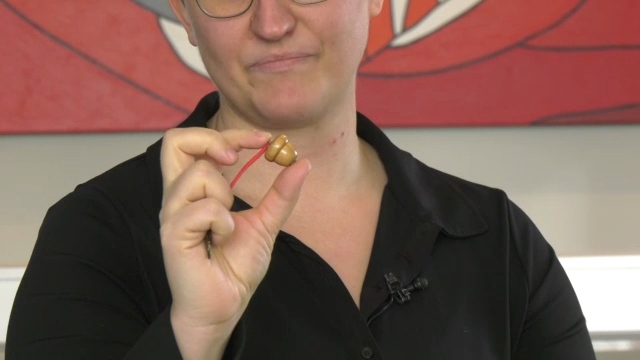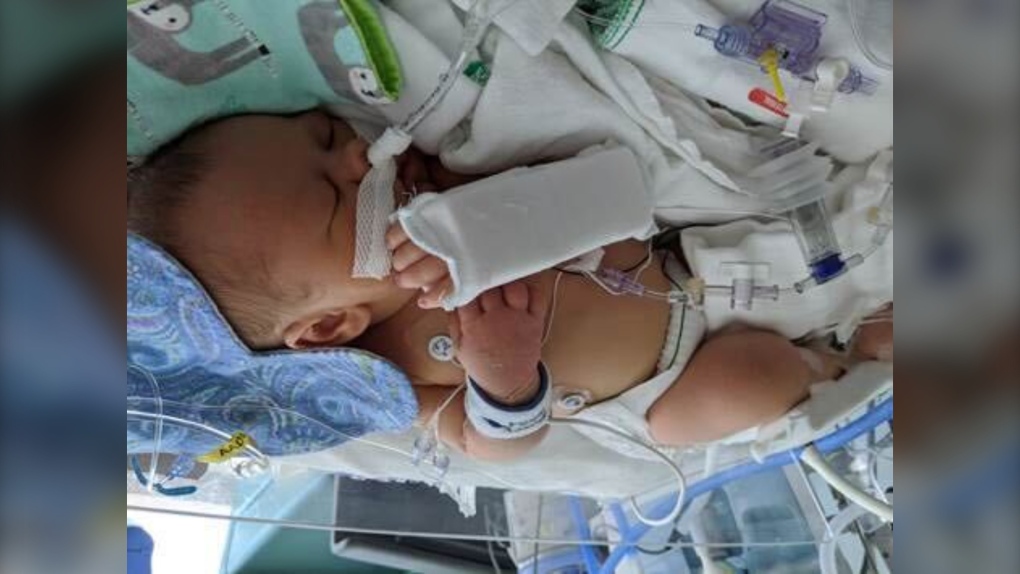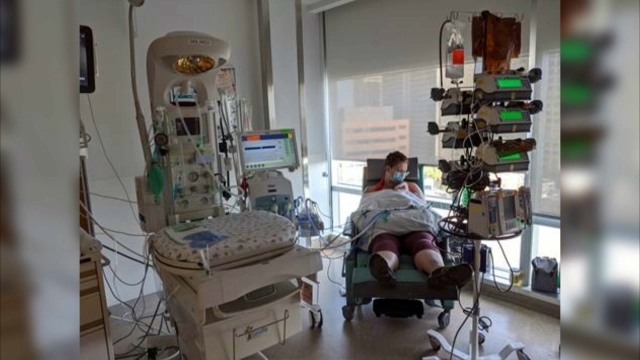'Even the playing field': New non-profit hopes to raise profile of congenital heart defects
An Alberta couple wants to ensure parents-to-be get the full picture when getting a sonogram after their son was born with a severe heart defect.
Amy Porter and her wife Sam learned in 2020 they would be expecting a baby boy. At 20 weeks, Amy's anatomy scan showed that her son, Artie, was looking healthy.
That scan missed a serious heart condition called transposition of the great arteries, where the position of the two main arteries carrying blood from the heart is switched, preventing proper flow.
Eight weeks later, Amy underwent an ultrasound as a precaution since doctors were concerned she measured large. That scan made a life-saving discovery.
"We found out that he had a very critical heart defect," Amy told CTV News Edmonton.
"I could tell that we were looking at his heart, but I didn't know why. And they are not legally allowed to tell you anything about your scans," she added. "So I kind of just had that in the back of my head."
She later found out from her obstetrician that she was being referred to specialists who would help her deliver her son.
"The only other information she gave was don't Google it," Amy said with a laugh. "I am a research nerd, and I find research very comforting. I feel if I know everything about something, then I won't be surprised."
Amy found out that her son's form of congenital heart defect was repairable through open-heart surgery and that the procedure had a success rate of 96 per cent.
 Amy holds a small keychain that represents the size of a heart at 20 weeks (CTV News Edmonton/Alison MacKinnon).
Amy holds a small keychain that represents the size of a heart at 20 weeks (CTV News Edmonton/Alison MacKinnon).
That diagnosis meant delivery in their chosen hospital was no longer an option. Her labour would be induced at the Royal Alexandra Hospital, only for Artie to be then rushed by specialized ambulance to the Stollery Children's Hospital.
"I got to see him at the end of the delivery table," Amy recounted. "I gave him a little rub on the head and let him go."
Amy had to stay as she recovered from her delivery. Her wife Sam accompanied Artie and saw him undergo life-saving heart surgery.
"That's when his oxygen saturation dropped, and that's when they had to intervene with a balloon septostomy to open up a hole between his top two atria," Sam explained.
"I was able to tell Amy that things were getting better," she added.
Artie is now a healthy and active two-year-old who loves to play with his older sister Frankie. He will have precautionary cardiology appointments annually to check on his heart.
 Artie rests after his surgery in 2020 (Supplied).
Artie rests after his surgery in 2020 (Supplied).
'THEY NEED A DIAGNOSIS AS EARLY AS POSSIBLE'
With the help of a pair of cardiologists, Amy has now started a new non-profit foundation to help increase awareness and the diagnosis rate of congenital heart defects.
"We're very grateful it was detected," Amy said. "But it was detected late. It should have been picked up at my 20-week anatomy scan."
 Artie was discharged after spending eight days in the hospital (Supplied).
Artie was discharged after spending eight days in the hospital (Supplied).
For Dr. Lisa Hornberger, that story is all too familiar. She works with Amy at the Tiny HeartsCan Foundation to support research and awareness of congenital heart defects.
"The biggest thing especially is having a diagnosis that's early enough in your pregnancy to know what's going on with your baby and get other tests to know what else is going on," Hornberger said.
"But also where there is a severe heart problem, [you have] to be delivered at the right place," she added.
According to the foundation, one in 100 kids will have a heart defect, which is also the most common congenital disease and the world's leading cause of infant mortality due to defect.
In Alberta, that means approximately 550 infants a year are born with a congenital heart defect, with research from the foundation suggesting half may not be detected before birth.
"They need a diagnosis as early as possible so that the doctors and the medical teams can be prepared to intervene right at that moment of birth," Amy said.
The foundation is also creating training for sonographers and hosting outreach sessions in rural parts of the province to educate health professionals on congenital heart defects. It hopes to become a national charity to further education programs beyond the province.
"These babies can be at risk of really severe outcomes in the first sort of minutes to days after birth," said Dr. Luke Eckersley, who also works with Tiny HeartsCan.
"Being on the right medications, having the right doctors, nurses, and right specialists around can make all the difference as far as their short- and long-term outcomes," he added.
"We just hope to even the playing field across the province, so everyone gets the best chance."
With files from CTV News Edmonton's Alison MacKinnon
CTVNews.ca Top Stories

'Shameful': Monument honouring fallen soldiers included names of living veterans
Veterans are asking for answers after discovering that two sculptures in Ontario honouring fallen soldiers include the names of many people who are very much alive.
Canada's air force took video of object shot down over Yukon, updated image released
The Canadian military has released more details and an updated image of the unidentified object shot down over Canada's Yukon territory in February 2023.
Days after gunman killed UnitedHealthcare's CEO, police push to ID him and FBI offers reward
The gunman who killed the CEO of the largest U.S. health insurer likely left New York City on a bus soon after the brazen ambush that has shaken corporate America, police officials said. But he left something behind: a backpack that was discovered in Central Park.
At dueling Mideast forums, officials ask what will happen when Donald Trump takes office
At glittering ballrooms in the Mideast this weekend, discussions of the wars and chaos gripping the region gave way to one central question: What's going to happen when U.S. president-elect Donald Trump takes office next month?
'If it ain't broke don't fix it': U.S. ambassador warns Canada against cutting Mexico out of trilateral trade deal
Cutting Mexico out of the current North American free trade deal 'may not be the best path to take,' says U.S. Ambassador to Canada David Cohen.
South Korean President Yoon's impeachment vote fails after ruling party boycotts it
A South Korean legislative push to impeach President Yoon Suk Yeol over his short-lived imposition of martial law fell through on Saturday after most lawmakers from his conservative governing party boycotted the vote.
Cookie inflation: How much more is your holiday baking costing you this year?
Estimate how much more your Christmas cookies will cost to bake this year compared to the past five years using Statistics Canada's monthly average retail price data.
LGBTQ2S+ refugees languish as Kenyan government blocks Canadians from resettling them
In a low-income neighbourhood on the outskirts of Nairobi, seven people gather in an air-conditioned home around a dinner table for a Ugandan stew of matoke bananas with peanut sauce.
An explosion has caused several injuries and damaged apartments in a Dutch city
An explosion and fire rocked a neighborhood in the Dutch city of The Hague early Saturday, destroying several apartments and injuring multiple people, according to authorities.


































